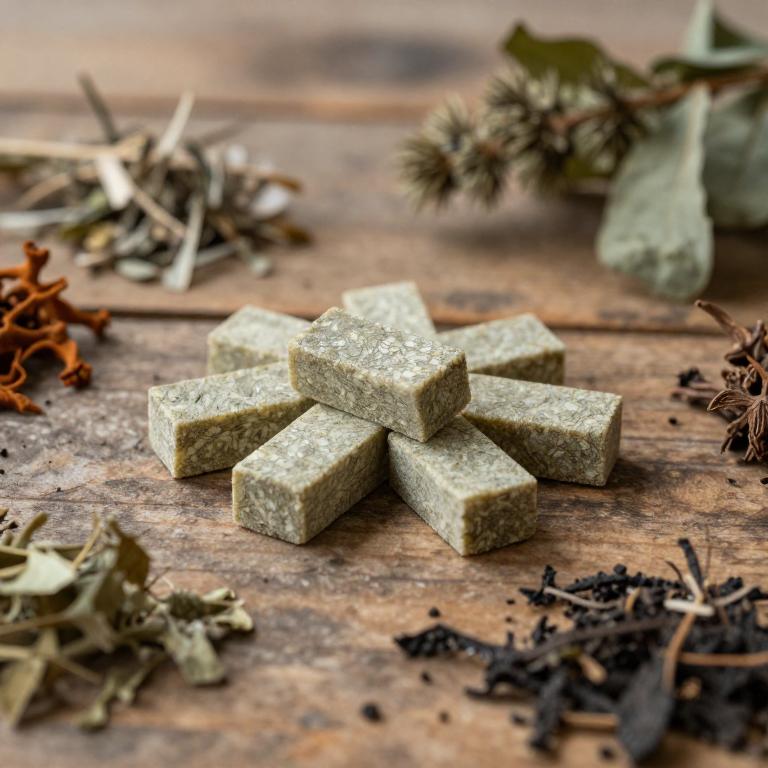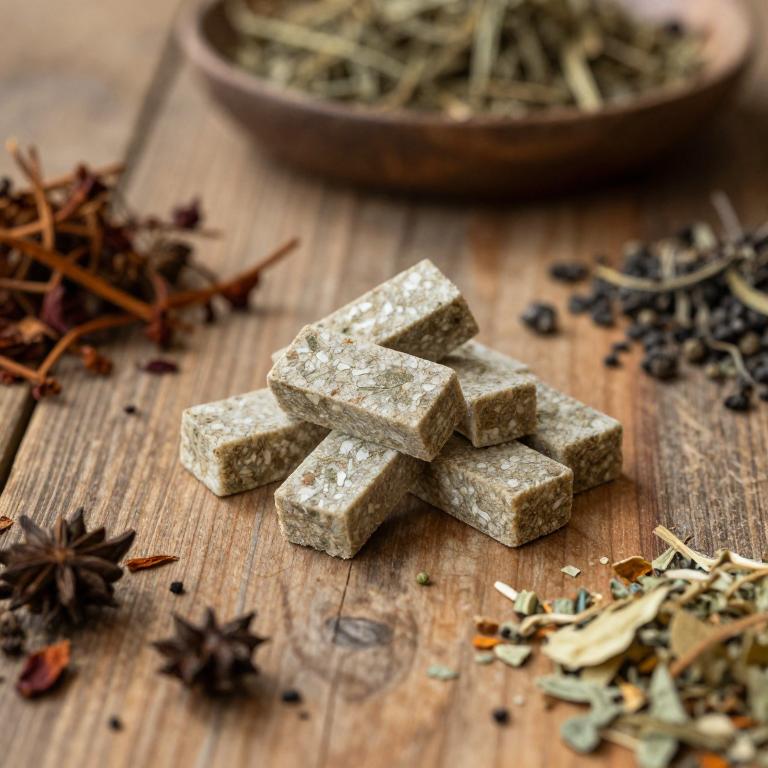10 Best Herbal Lozenges For Sinusitis

Herbal lozenges are a popular natural remedy for alleviating symptoms of sinusitis, offering a gentler alternative to pharmaceutical treatments.
These lozenges often contain ingredients such as eucalyptus, menthol, thyme, and ginger, which are known for their decongestant and anti-inflammatory properties. They can help reduce nasal congestion, ease throat irritation, and promote clearer breathing by soothing the mucous membranes. Many herbal lozenges are free from synthetic additives, making them suitable for individuals seeking holistic health solutions.
However, it is important to consult a healthcare provider before using them, especially for those with allergies or underlying medical conditions.
Table of Contents
- 1. Eucalyptus (Eucalyptus globulus)
- 2. Ginger (Zingiber officinale)
- 3. Salvia (Salvia officinalis)
- 4. Peppermint (Mentha piperita)
- 5. Stinging nettle (Urtica dioica)
- 6. Thyme (Thymus vulgaris)
- 7. Black pepper (Piper nigrum)
- 8. Ceylon cinnamon (Cinnamomum verum)
- 9. Rosemary (Rosmarinus officinalis)
- 10. Catnip (Nepeta cataria)
1. Eucalyptus (Eucalyptus globulus)

Eucalyptus globulus, commonly known as eucalyptus or gum tree, is a widely used herbal remedy for its potent anti-inflammatory and decongestant properties.
Eucalyptus globulus herbal lozenges are formulated to provide relief from symptoms of sinusitis by soothing irritated nasal passages and reducing mucus buildup. These lozenges contain essential oils derived from the leaves of the eucalyptus plant, which have been traditionally used in natural medicine for respiratory support. The aromatic compounds in the lozenges help to open up airways and promote easier breathing, making them a popular choice for individuals suffering from sinus congestion.
When used as part of a holistic approach to sinusitis management, these lozenges can offer a safe and effective alternative to conventional medications.
2. Ginger (Zingiber officinale)

Zingiber officinale, commonly known as ginger, has been traditionally used for its anti-inflammatory and antimicrobial properties, making it a popular ingredient in herbal lozenges for sinusitis.
These lozenges are designed to help alleviate symptoms such as nasal congestion, postnasal drip, and facial pain associated with sinus infections. The active compounds in ginger, including gingerol and shogaol, may help reduce inflammation in the nasal passages and improve mucus flow. Additionally, ginger's warming effect can help soothe irritated tissues and promote better breathing.
While generally considered safe, individuals with gastrointestinal issues or on blood-thinning medications should consult a healthcare provider before using ginger-based lozenges.
3. Salvia (Salvia officinalis)

Salvia officinalis, commonly known as sage, has been traditionally used for its anti-inflammatory and antimicrobial properties, making it a promising ingredient in herbal lozenges for sinusitis.
These lozenges are designed to soothe irritated nasal passages and reduce the symptoms of sinus inflammation by promoting mucus drainage and decreasing swelling. Sage contains compounds like thujone and rosmarinic acid, which may help combat bacterial and viral infections often associated with sinusitis. The use of salvia officinalis lozenges offers a natural alternative for individuals seeking relief without the side effects of conventional medications.
However, it is important to consult with a healthcare provider before using these lozenges, especially for those with existing health conditions or who are taking other medications.
4. Peppermint (Mentha piperita)

Mentha piperita, commonly known as peppermint, is a popular herbal ingredient used in lozenges for the relief of sinusitis symptoms.
These lozenges work by providing a cooling and refreshing sensation that can help soothe irritated nasal passages and reduce congestion. The active compounds in peppermint, such as menthol, act as decongestants and may help alleviate the discomfort associated with sinus pressure and inflammation. Peppermint lozenges are often favored for their natural formulation, making them a safe option for many individuals seeking relief without synthetic medications.
However, they are most effective when used as part of a comprehensive approach to managing sinusitis, including hydration, rest, and possibly other complementary treatments.
5. Stinging nettle (Urtica dioica)

Urtica dioica, commonly known as stinging nettle, is a herb that has been traditionally used for its anti-inflammatory and decongestant properties.
Urtica dioica herbal lozenges are formulated to provide natural relief from symptoms of sinusitis by reducing nasal congestion and inflammation. These lozenges work by supporting the body's natural immune response and promoting clearer breathing. They are often preferred by individuals seeking alternative or complementary treatments to conventional sinusitis medications.
As with any herbal supplement, it is advisable to consult a healthcare professional before use, especially for those with existing medical conditions or who are taking other medications.
6. Thyme (Thymus vulgaris)

Thymus vulgaris herbal lozenges are formulated with thyme extract, a well-known herb traditionally used for its antimicrobial and anti-inflammatory properties.
These lozenges are designed to provide natural relief for symptoms associated with sinusitis, such as congestion, throat irritation, and persistent cough. The active compounds in thyme, including thymol and carvacrol, help to reduce mucus production and combat respiratory infections. They are often recommended as a complementary therapy for individuals seeking a holistic approach to managing sinusitis.
However, it is advisable to consult with a healthcare professional before using these lozenges, especially for those with underlying health conditions or who are taking other medications.
7. Black pepper (Piper nigrum)

Piper nigrum, commonly known as black pepper, has been traditionally used in herbal medicine for its anti-inflammatory and antimicrobial properties.
Piper nigrum herbal lozenges are formulated to provide relief from the symptoms of sinusitis by reducing nasal congestion and inflammation. These lozenges contain piperine, the active compound in black pepper, which may help enhance the absorption of other medicinal ingredients and support immune function. The warming and stimulating effects of black pepper can also help clear mucus and alleviate sinus pressure.
While generally safe, individuals with sensitive stomachs or those on certain medications should consult a healthcare provider before using these lozenges.
8. Ceylon cinnamon (Cinnamomum verum)

Cinnamomum verum, commonly known as true cinnamon, has been traditionally used for its anti-inflammatory and antimicrobial properties, making it a valuable ingredient in herbal lozenges for sinusitis.
These lozenges work by soothing irritated nasal passages and reducing mucus production, which can alleviate congestion and discomfort associated with sinus infections. The essential oils in cinnamon, such as cinnamaldehyde, help to combat bacteria and viruses that may contribute to sinus inflammation. When used as part of a holistic approach, these lozenges can support natural healing without the side effects of conventional medications.
However, it is important to consult with a healthcare provider before using cinnamon lozenges, especially for individuals with allergies or chronic sinus conditions.
9. Rosemary (Rosmarinus officinalis)

Rosmarinus officinalis, commonly known as rosemary, is a herbal ingredient often used in lozenges for its potential benefits in alleviating symptoms of sinusitis.
These lozenges are formulated with rosemary extract, which is believed to have antimicrobial and anti-inflammatory properties that may help reduce nasal congestion and sinus inflammation. The aromatic compounds in rosemary can also act as a decongestant, promoting clearer breathing and easing discomfort associated with sinus infections. Additionally, rosemary lozenges are often preferred by individuals seeking natural remedies for sinusitis, as they may offer a gentler alternative to pharmaceutical medications.
Overall, these herbal lozenges can be a supportive option in managing the symptoms of sinusitis when used as part of a holistic treatment approach.
10. Catnip (Nepeta cataria)

Nepeta cataria, commonly known as catnip, has been traditionally used for its calming and anti-inflammatory properties, and it is now available in the form of herbal lozenges for sinusitis relief.
These lozenges are designed to soothe irritated nasal passages and reduce congestion by leveraging the plant's natural compounds, such as nepetalactone. The herbal formulation may help alleviate symptoms like sneezing, postnasal drip, and nasal itching associated with sinusitis. While generally considered safe, individuals with allergies to the mint family should exercise caution.
As a complementary therapy, nepeta cataria lozenges can be a gentle and natural option for managing mild to moderate sinusitis symptoms.